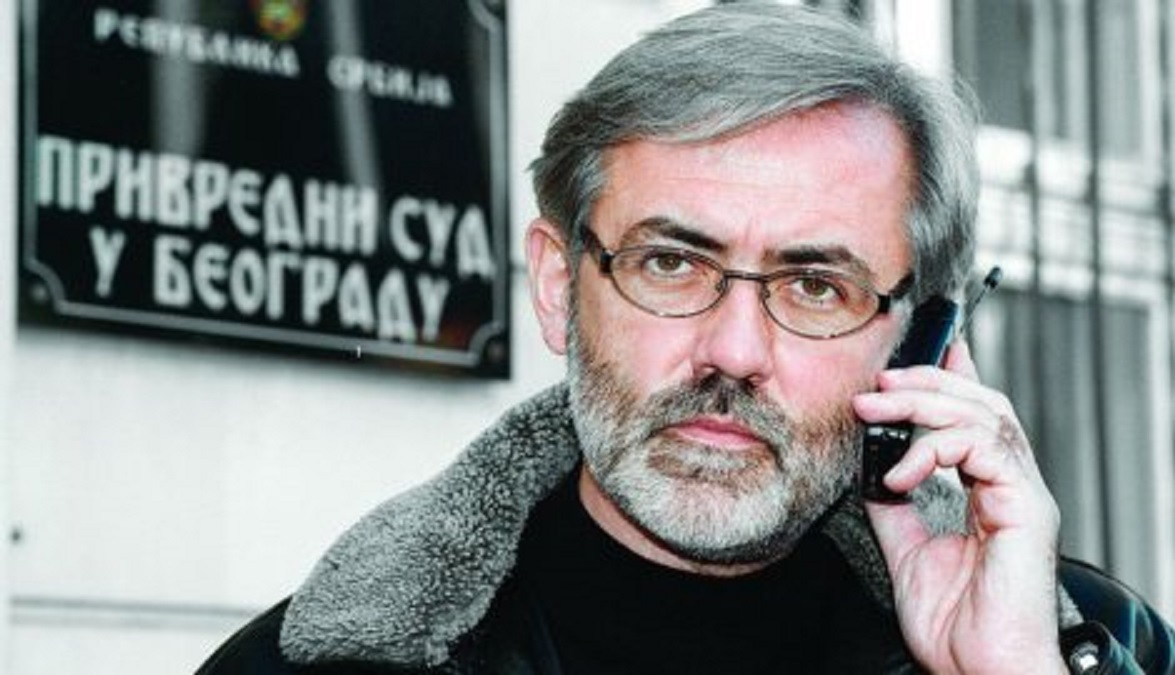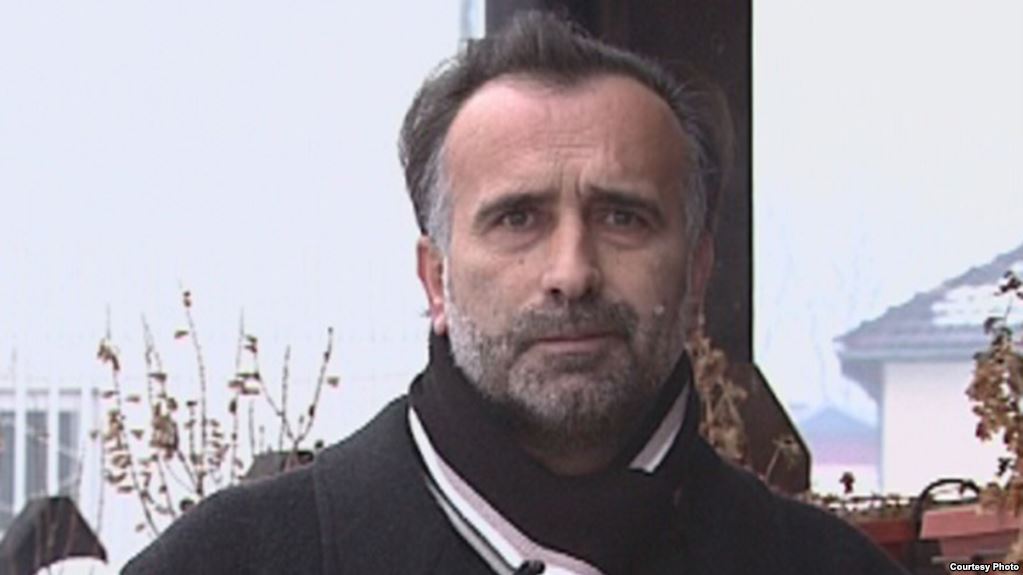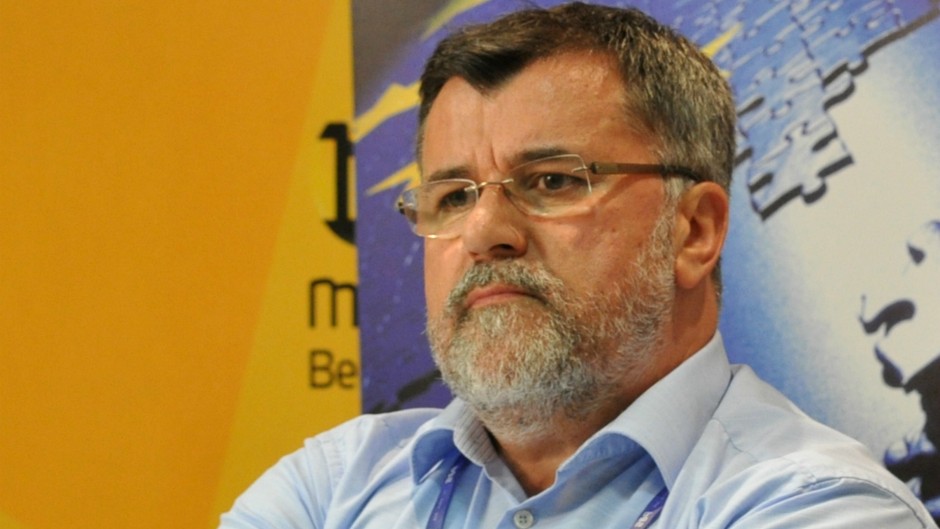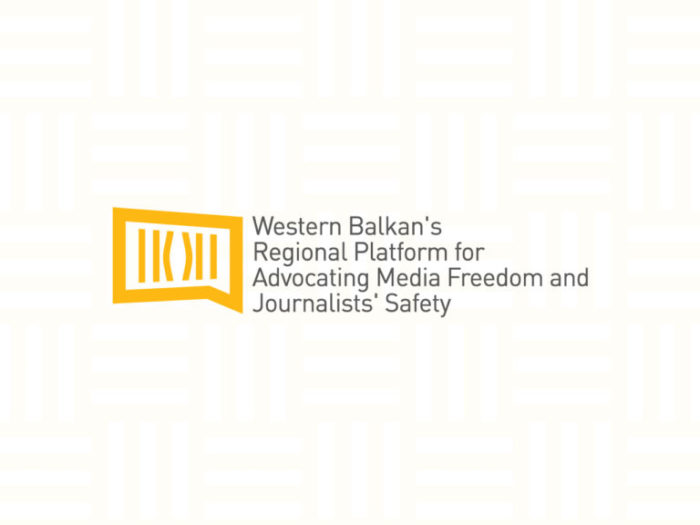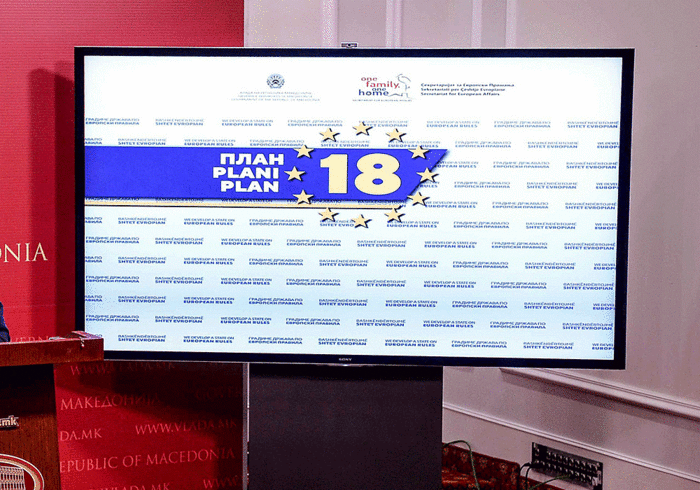Posle nekoliko najava i odlaganja od septembra do danas, i gotovo sedam meseci žestokih rasprava oko nekoliko čudnih odluka suda, moguće je da na sutrašnjem nastavku troipogodišnjeg procesa za ubistvo novinara Slavka Ćuruvije napokon počne iznošenje završnih reči.
U aprilu su odbrana optuženih i tročlano sudsko veće (predsedavajuća Snežana Jovanović, Vladimir Mesarović i Dragan Milošević) pokušali da iz dokaznog materijala izuzmu možda i najvažnije dokaze u ovom predmetu.
Radi se najpre o delu traka koje nose podatke sa baznih stanica mobilne telefonije iz centra Beograda, koje pokazuju gde su se nalazili i sa kim su komunicirali optuženi pre, na dan i posle ubistva Ćuruvije 11. aprila 1999. godine.
Bilo je sporno i svedočenje Dragana Kecmana, policajca koji je istraživao ubistvo Ćuruvije od prvog dana, prikupio ključne dokaze i posle gotovo 16 godina istrage napisao krivičnu prijavu protiv optuženih, sve dok u novembru, posle iznenadnog obrta, sudsko veće njegovo svedočenje nije ipak dozvolilo.
Izjave iz istražnog postupka dvojice preminulih svedoka, koji su neobično važni za rasvetljavanje ovog slučaja, sudsko veće je takođe želelo da izbaci iz postupka. Radi se o svedočenjima Zorana Pavića, načelnika Devetog (pratećeg) odeljenja CRDB Beograd, i Cvijetina Milinkovića, dežurnog načelnika na dan ubistva Ćuruvije, koji je u dnevnik dežurstva (videti prilog) zapisivao sve što se događalo dok je jedna smena iz Devetog odeljenja RDB-a (ukupno 27 obaveštajaca) pratila novinara praktično do samog ubistva.
Apelacioni sud je u tom periodu čak tri puta odbacivao odluke prvostepenog suda i vraćao na ponovno odlučivanje, tvrdeći da dokazi kao što su trake sa baznih stanica i izjave policajaca o informativnim razgovorima sa sada preminulim pripadnicima RDB-a Milinkovićem i Pavićem ne treba da budu izuzeti iz ovog procesa.
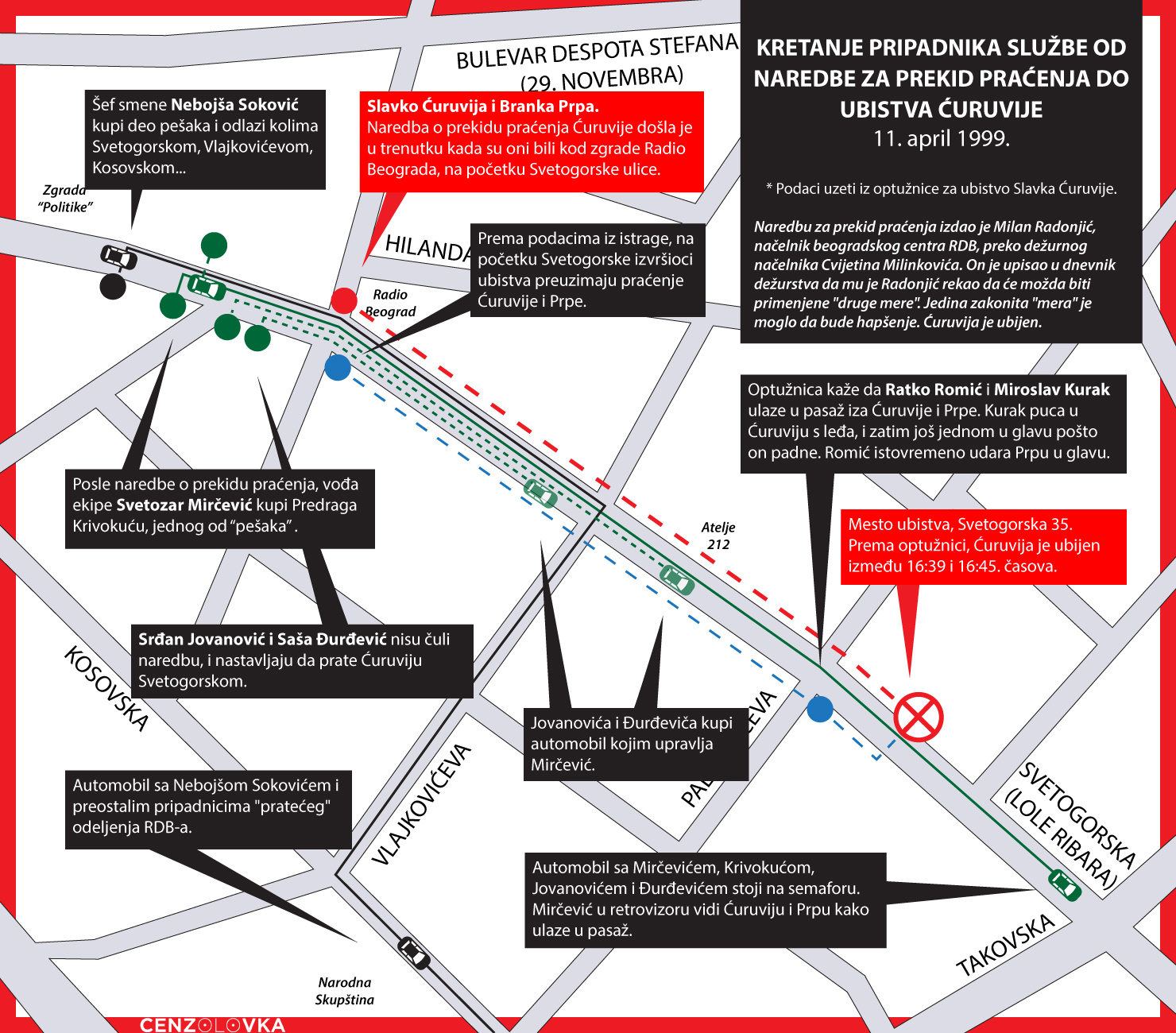
Infografika: Cenzolovka
Radonjić Milinkoviću: Možda primenimo neku drugu meru
Tako da je, ako ne bude novih procesnih predloga i iznenadnih manevara učesnika ovog procesa, moguće da na sutrašnjem ročištu počne iznošenje završnih reči.
To bi značilo da tužilac, advokati dece Slavka Ćuruvije Jelene i Radeta, te Branke Prpe, koja je bila sa Ćuruvijom na dan ubistva, branioci optuženih i, na kraju, sami optuženi mogu da govore po sat vremena – na koliko je Snežana Jovanović ograničila njihova izlaganja.
U tom slučaju, prvi bi završnu reč izneo Milenko Mandić, zamenik tužioca za organizovani kriminal, koji je i potpisao optužnicu protiv četvorice optuženih – bivšeg načelnika Resora državne bezbednosti Radomira Markovića, načelnika CRDB Beograd Milana Radonjića, nekadašnjeg glavnog obaveštajnog inspektora u Drugoj upravi RDB-a Ratka Romića, te pripadnika rezervnog sastava RDB-a Miroslava Kuraka, kome se sudi u odsustvu.
Mandić bi trebalo da potvrdi valjanost najvažnijih dokaza koji pokazuju da je ova, kako piše u optužnici, „organizovana kriminalna grupa, u kojoj je svaki pripadnik imao unapred određeni zadatak i ulogu“, „po nalogu NN lica iz najviših struktura vlasti“, „sa umišljajem lišila života“ Slavka Ćuruviju.
Mandić je od juna 2015. godine, kada je suđenje počelo, izveo desetine svedoka iz javne i državne bezbednosti, kao i materijalne dokaze koji su trebali da pokažu na koji su to način četvorica pripadnika Službe organizovali i izvršili ovaj zločin usred NATO bombardovanja.
Među najvažnijim materijalnim dokazima su podaci sa baznih stanica mobilne telefonije koji su nedavno predstavljeni pred sudom. Novinari nisu imali prilike da ih vide, pošto su se izveštaji o veštačenju tih podataka smenjivali na ekranu u sudnici jako brzo, pa se tako javnost sa njima nije detaljnije upoznala.
Radi se o podacima koji, kako tvrdi zamenik tužioca, dokazuju da su 10. aprila 1999, na dan kada je, prema optužnici, planirana likvidacija novinara, optuženi imali intenzivnu komunikaciju, kao i da su se, dok je tog dana Ćuruvija sa Prpom bio u šetnji i na ručku u centru Beograda, Romić i Kurak nalazili u blizini mesta gde je Ćuruvija živeo, u Svetogorskoj 35 (u to vreme je to bila Ulica Ive Lole Ribara).
Tog dana, 10. aprila, ekipa koja je pratila Ćuruviju i Prpu nije na vreme izvestila načelnika beogradskog centra RDB-a Milana Radonjića da se oni vraćaju iz šetnje i da ulaze u svoj stan.
Radonjić je, inače, na tu dužnost postavljen svega nekoliko dana pre ovog zločina i jedno od prvih njegovih naređenja – usred bombardovanja – bila je usmena naredba Zoranu Paviću da 24 sata dnevno prati novinara. Paviću, koga je on sam nekoliko dana pre toga postavio za načelnika Devetog odeljenja, koje je za ovaj slučaj od presudne važnosti.
Zamenik tužioca je izveo nekoliko svedoka koji su potvrdili ono što on tvrdi u optužnici – da je Radonjić pozvao Zorana Pavića i Dragana Pavića (koji je vodio ovo praćenje) i da im je zamerio što nisu dovoljno često izveštavali. Tražio je od njih da sutradan, 11. aprila, izveštavaju na svaki minut, o bukvalno svakoj promeni kretanja Ćuruvije.
Nekoliko svedoka je tokom suđenja potvrdilo Mandićeve navode u optužnici da je takav način rada pratećeg odeljenja veoma neobičan, te da na taj način ni pre niti posle toga nisu taj posao radili.
Sutradan, 11. aprila, izveštavali su veoma često dežurnog načelnika u CRDB Beograd, Cvijetina Milinkovića, koji je o svemu izveštavao Radonjića, a najvažnije promene zapisao je i u dnevnik dežurstva (videti faksimil).
Milinković je u dnevnik dežurstva u 16.07 upisao: „Zove NC (načelnik centra, prim. nov.) prenosim mu ovo. Nalog – javiti mu odmah ako krenu kući, možda primenimo i neku drugu meru, kaže. Odmah sam preneo NO/IX da obavezno jave ako objekat krene kući.“
Jedina zakonita „druga mera“ u tim uslovima moglo bi biti hapšenje ili privođenje onog ko se prati. Slavko Ćuruvija je, međutim, nekih pola sata kasnije ubijen.
U 16.25, kako je Milinković upisao u dnevnik dežurstva, Radonjić je naredio nagli prekid praćenja.
U to vreme se Slavko Ćuruvija sa Brankom Prpom nalazio u Makedonskoj ulici, negde između zgrade Politike i Radio Beograda, blizu ulaza u današnju Svetogorsku ulicu.
Očigledno je trebalo nekoliko minuta da ova naredba bude sprovedena. Naime, policija je procenila da je Ćuruvija ubijen između 16.39 i 16.45 sati, ali od Radio Beograda do prolaza u Svetogorskoj 35, gde je zločin izvršen, ima tek nekih četiri-pet minuta normalnog hoda.
Kao što se može videti na grafikonu, naređenje o prekidu praćenja nije baš najefikasnije izvršeno. Naime, bar dvojica pratilaca Ćuruvije, takozvani pešaci, nisu čuli ili nisu dobro razumeli ovo naređenje, pa su ušli i u Ulicu Ive Lole Ribara (Svetogorsku) za Ćuruvijom i Prpom.
Vođa ekipe ovih „pešaka“, Svetozar Mirčević, koji je vozio jedan od dva automobila koji su pokupili pripadnike Devetog odeljenja (sivi opel astra), kolima je presreo dvojicu „pešaka“ tek u blizini ugla sa Vlajkovićevom, odnosno preko puta Ateljea 212. Jedan od „pešaka“, Saša Đurđević, pratio je Ćuruviju sve do Ateljea 212, gde mu je kolima prišao Mirčević i gestikulacijom pokazao da je praćenje prekinuto i da odmah uđe u opel. Istina, postoje i nagoveštaji da ih je pratio sve do mesta zločina, ali to na sudu, gde su svedoci često delovali konfuzno ili su se slabo čega sećali – nije potvrđeno.
Oni su, dakle, prošli Ćuruviju i Prpu u Svetogorskoj, u visini restorana „57“, mimoišli se i sa ubicama (o čemu nisu svedočili, odnosno rekli su da ih nisu videli), te se zaustavili na semaforu kod Takovske ulice, kada je Mirčević u retrovizoru video Ćuruviju i Prpu kako ulaze u pasaž kod broja 35. Tada je kolskom radio-stanicom javio šifru „važi 47“, koja, prema šifrarniku Službe, znači da objekat praćenja ulazi u zgradu u kojoj živi.
Svega nekoliko sekundi kasnije Ćuruvija je u tom prolazu ubijen. Mirčević pred sudom nije rekao da je u retrovizoru video i ubice. Sve skupa, na ovo javljanje nervozno je reagovao šef smene Nebojša Soković, koji je odmah preko radija naredio: „Pusti to, pusti to!“
Soković, koji je vozio drugi automobil sa „pešacima“, takođe je prošao pored Slavka Ćuruvije, pre nego što je, kao što se vidi na grafikonu, iz tadašnje Ulice Ive Lole Ribara skrenuo u Vlajkovićevu, zatim u Kosovsku, pa u Takovsku, i odvezao se do tadašnje trolejbuske okretnice pored Kalemegdana (na kraju Knez Mihailove ulice).
Dragan Kecman je, svedočeći pred sudom, preneo svoja saznanja da je tamo, kada se pronela vest da je Ćuruvija ubijen, ljudima koji su ga pratili rekao: „Dupe uza zid, niko ništa da ne priča“.
Oba automobila – i Sokovićev i Mirčevićev – morala su da prođu pored ubica: Ratko Romić i Miroslav Kurak, prema optužnici, čekali su u blizini raskrsnice sa Palmotićevom, blizu prolaza ka zgradi u kojoj je Ćuruvija živeo.
Da li su „pešaci“ videli ubice ostaće tajna, bar za ovo sudsko veće.
Radonjić 21 put zove Kuraka
Ali, bar kako zamenik tužioca navodi, to nije ostalo tajna i za bazne stanice mobilne telefonije (u to vreme Mobtela) u centru Beograda. One su, kako je to inspektor Dragan Kecman 2005. godine otkrio, zabeležile veoma intenzivnu komunikaciju sa brojeva telefona za koje je već ranije znao da su ih u to vreme koristili Milan Radonjić, Ratko Romić, Miroslav Kurak i Radomir Marković.
Pokazale su, takođe, da se Romić i Radonjić nisu nalazili tamo gde su tokom istrage tvrdili da su bili: Romić je rekao da je tokom 11. aprila, na dan ubistva, bio u Drugoj upravi, u Učiteljskom naselju koje se nalazi na Konjarniku, kao i da nije siguran da li je bio na porodičnom ručku u Borči ili je to bila večera.
Bazne stanice su, međutim, broj telefona koji je koristio locirale upravo u blizini mesta zločina.
Radonjić je na početku suđenja rekao da je bio u istoj zgradi Druge uprave na Konjarniku, te da je išao na ručak kod ženinih roditelja, blizu mesta gde je radio. Bazne stanice su ga smestile na različita mesta u gradu, sa kojih se čak 21 put čuo sa Miroslavom Kurakom.
Milan Radonjić je, prema dnevniku dežurnog načelnika (videti antrfile i faksimil), u 16.25 ekipi iz Devetog odeljenja naredio prekid praćenja.
Tada, prema zameniku tužioca, praćenje Ćuruvije i Prpe preuzimaju izvršioci ubistva. Podaci sa baznih stanica govore da se oni nalaze u blizini mesta zločina, kao i da Ratko Romić zove Miroslava Kuraka, koji čeka u blizini prilaza ka zgradi u kojoj živi Ćuruvija.
Već u 16.28 Radonjić je pozvao Miroslava Kuraka i razgovarao sa njim 9 sekundi.
U 16.38 Ratko Romić poziva Kuraka i priča sa njim 6 sekundi.
Romić odmah posle toga, u 16.39 poziva Radonjića i sa njim razgovara 8 sekundi.
Radonjić zatim zove Kuraka u 16.45 (17 sekundi), u 16.54 Romić zove Radonjića (11 sekundi).
Upravo je period ove intenzivne komunikacije, kao i mesto na kojima su Romića i Kuraka, kao izvršioce, bazne stanice locirale, ukazao istražiteljima i tužiocu da je Ćuruvija ubijen između 16.39 i 16.45 sati.
Tog dana, 11. aprila, bazne stanice su zabeležile čak 21 razgovor između Radonjića i Kuraka (Kurak je pozvao Radonjića tri puta, 18 puta je Radonjić Kuraka).
Ratko Romić se sa Radonjićem, na svoju inicijativu, čuo četiri puta. Svog kuma, Kuraka, pre ubistva je pozvao dva puta i jednom posle ubistva.
Zabeleženo je da je posle ubistva (u 17.20) Radonjić pozvao i Radomira Markovića, kao i njegovog zamenika Branka Crnog (u 17.11 i 17.22).
Tog dana se čuo i sa Frankom Simatovićem, visokim oficirom RDB-a, osnivačem Jedinice za specijalne operacije.
Četiri puta se te večeri čuo i sa operativcem RDB-a Momirom Gavrilovićem, koji je kasnije ubijen.
Radomiru Markoviću, Milanu Radonjiću i Ratku Romiću se danas, gotovo 20 godina posle ubistva Ćuruvije, sudi.
Kurak je, sudeći po pisanju pojedinih medija, u Tanzaniji, gde je fotografisan sa trofejima kao što su lavovi ili leopardi. Postoje informacije i da je 2011. godine u Adis Abebi dobio novi pasoš Republike Srbije.
DNEVNIK DEŽURNOG: MOŽDA PRIMENIMO I NEKU DRUGU MERU, KAŽE
Evo nekoliko citata iz dnevnika dežurstva, koji je 11. aprila, na dan ubistva Slavka Ćuruvije, u beogradskom centru RDB-a vodio dežurni načelnik Cvijetin Milinković.
– 13.55: NO/IX (načelnik Devetog odeljenja, Zoran Pavić, prim. nov.) izveštava da je „Ćuran izašao sa suprugom pešice“. Preneto NC-u (načelnik centra Milan Radonjić, prim. nov.).
– 13.56: NO/IX izveštava „Ćuran je kraj Politike“. Odmah preneto NC-u. Da ga obavestim čim negde bude „seo“.
– 14.15: NO/IX izveštava da se „Ćuran sreo kod Ruskog cara sa jednim bračnim parom, a zatim sa još jednim čovekom sa naočarima i bradicom. Sa parom kratak susret, a sa čovekom su pričali, a zatim se sa suprugom uputio Knez Mihajlovom“. NO/IX je javljao svaku promenu a NC je više puta zvao, ja mu prenosio.
– 14.45: U sklopu toga u 14.45 preneto mu od ZNC-a obaveštenje da je u vezi onih 5 kola sve u redu.
– 14.55: „NC je u 14.55 na sp. 21 35 (U/II).“
– 15.15: „NO/IX – Šetaju se kod Nebojšine kule. Čovek sa bradicom seo sa društvom u kafanu. Sve je pod kontrolom. Preneto NC-u, kaže da ga obavestimo ako negde sedne ili krene kući. Preneto NO/IX.“
– 16.05: „NO/IX – Ćuran i supruga ušli u Kolarac, tu sreli pomenute veze, bračni par i muškarca, odatle izašli i svak na svoju stranu. Još držimo vezu – muškarca.“
– 16.07: „Zove NC prenosim mu ovo. Nalog – javiti mu odmah ako krenu kući, možda primenimo i neku drugu meru, kaže. Odmah sam preneo NO/IX da obavezno jave ako objekat krene kući.“
– 16.10: „NO/IX – vratio se u objekat u Kolarac i seli su. Preneo NC-u. Nalog NC-a da mu javi ako ručaju. Preneo načelniku NO/IX taj nalog. NO/IX kaže da su kamerom snimili vezu – bradonju.“
– 16.22: „NO/IX – ručaju. NC-u preneo ovo. Kaže da će da se konsultuje pa će se javiti za 2 minuta.“
– 16.25: „NC – prekinuti rad prema objektu a vezu-bradonju nastaviti dok ne utvrdimo o kome se radi. Preneto NO/IX.“
Faksimil dnevnika dežurstva PDF
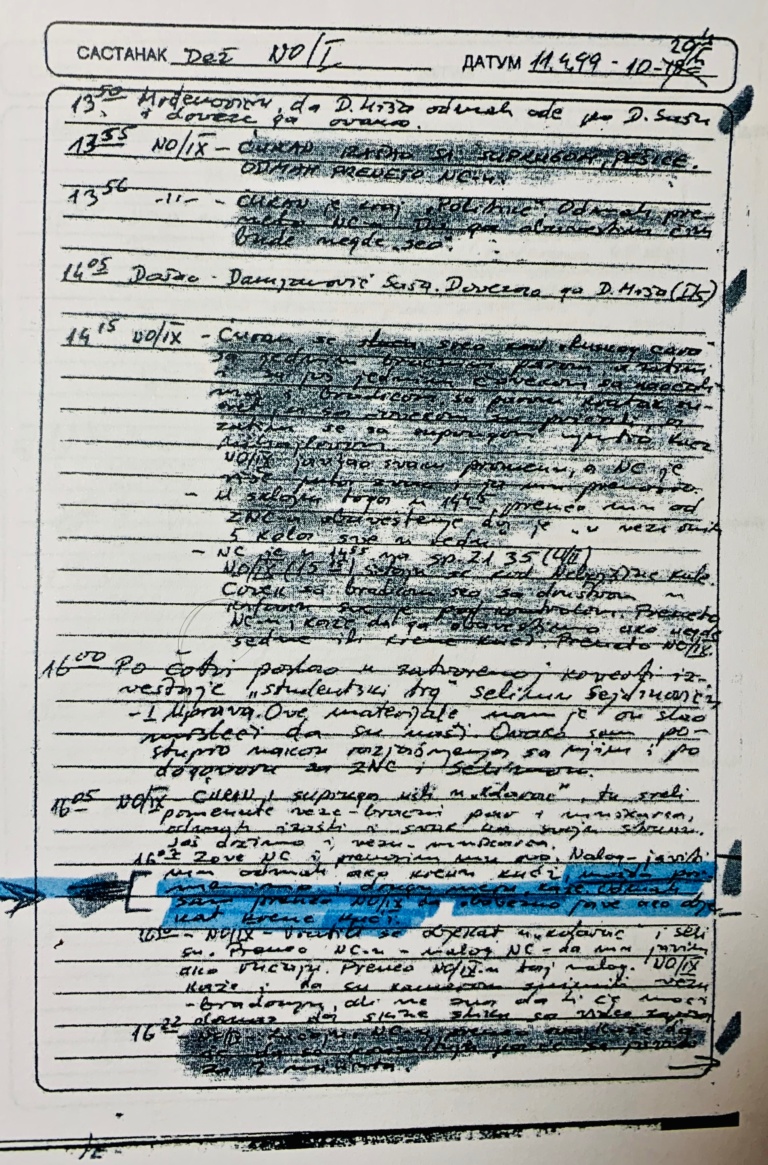
Faksimil kopije dnevnika dežurnog načelnika CRDB Beograd, koji je 11. aprila 1999. godine vodio Cvijetin Milinković. Ovde su njegove beleške u vreme ubistva Ćuruvije. Delovi teksta su obeleženi kasnije.



